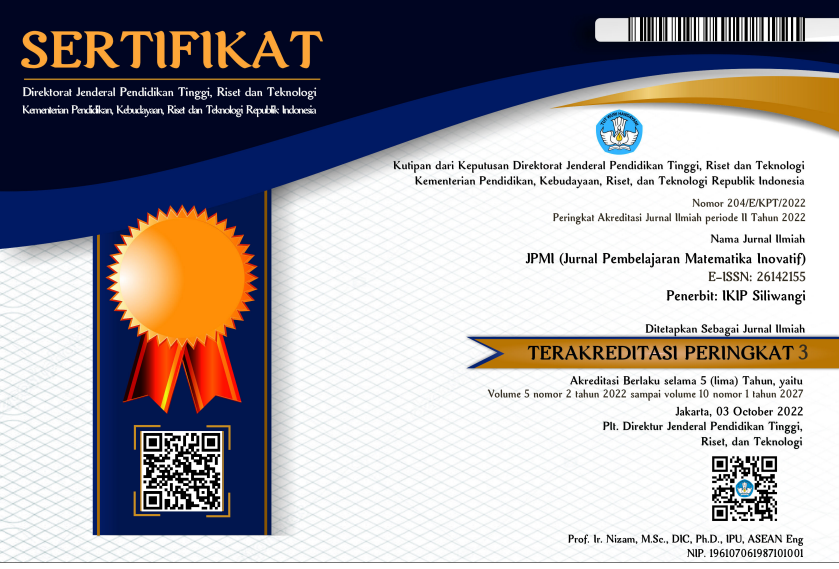PENGEMBANGAN E-LKPD MATEMATIKA INTERAKTIF BERBASIS LITERASI DIGITAL
DOI:
https://doi.org/10.22460/jpmi.v5i6.12530Keywords:
Research development (R & D), Interactive E-LKPD, Digital LiteracyAbstract
Interactive e-LKPD can be used as a medium for teaching materials that can identify and train digital literacy skills. Interactive E-LKPD is a two-way communication, student worksheets that can perform several activities with feedback with feedback. Social arithmetic is the subject matter studied in junior high school. The subject matter of social arithmetic provides benefits for students in solving problems of daily life, but some students have difficulty solving arithmetic problems. Therefore, this study aims to develop an interactive mathematics E-LKPD based on digital literacy. This type of R and D uses a 4D development model including “Define, Design, Development, and Desseminateâ€, but limitations without “Disseminateâ€. The results showed the feasibility of fulfilling several criteria: the validity obtained from the validation results of media experts was 99% and material experts were 95%, the results were both in the "very valid" category. Effectiveness is obtained from the results of class completeness getting 100% "very effective". And the practicality obtained from the results of student responses is 98% "very practical". Thus, the interactive mathematics E-LKPD based on digital literacy can be used as media for teaching materials for the learning process.Â
References
Angreni, S. (2017). Pengaruh penggunaan media interaktif disertai LKS terhadap hasil belajar IPA pada kelas IX SMP. Scientiae Educatia: Jurnal Pendidikan Sains, 6(1). 36-40.
Bawden. (2001). Information and digital literacies: a review of concepts. Jurnal of documentation, 57(2), 218-259.
Dewi, P. F. (2010). Pengembangan Lembar Kerja Siswa (LKS) Interaktif pada Pembelajaran Kimia Pokok Bahasan Hidrokarbon di SMA Negeri 5 Palembang . Skripsi. Palembang: FKIP Universitas Sriwijaya.
Frydenberg, M. d. (2011). Learning for 21 st Century Skills. International Conference on Information Society.
Gilster, P. (1997). Digital literacy. New York: John Wiley & Sons, Inc.
Kusnawati, L. E. (2015). Pengembangan Multimedia Pembelajaran Interaktif "Struktur dan fungsi Organ Tumbuhan" Mata Pelajaran Biologi Untuk Siswa Kelas VIII SMP Negeri 11 Magelang. Yogyakarta: Universitas Negeri Yogyakarta.
Meinarsih, Y. (2018). Animasi pembelajaran biologi untuk kelas x sma berbasis multimedia. Smart Comp: Jurnalnya Orang Pintar Komputer, 7(2), 281-285.
Pratiwi, N. d. (2017). Pengaruh Literasi Digital Terhadap Psikologi Anak dan Remaja. Semantik.
Riduwan. (2013). Dasar-dasar Statistika. Bandung: Alfabeta.
Riduwan, R., & Sunarto, S. (2017). Pengantar Statistika untuk Penelitian: Pendidikan, Sosial, Komunikasi, Ekonomi, dan Bisnis. Bandung: Alfabeta.
Riswanto, R. (2018). Pemanfaatan Bahan Ajar Matematika Berbasis Internet Untuk Meningkatkan Pemahaman Kosep, Menumbuhkan Literasi Digital Dan Kemandirian Belajar. Jurnal Education, 5(2), 40-48.
Sari, Y. (2019). Pengembangan elkpd elektronik dengan 3d pageflip professional berbasis literasi digital . Doctoral dissertatio, UIN Raden Intan Lampung.
Sarrab, M. (2012). Mobile Learning (M-Learning) and Educational Environmens. International Journal of Distributed and Parallel Systems.
Sugiyono. (2019). Metode Penelitian Kuantitaif, Kualitatif R&D. Bandung: Alfabeta.
Thiagarajan, S. d. (1974). Instuctional Development for Training Teachers of Exceptional Children. Washinton DC: National Center for Improvment Educational System.

















